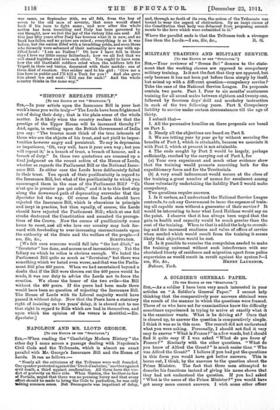"HISTORY REPEATS ITSELF."
[To THE EDITOR OF THE "SPECTATOR.")
Sin,—In your article upon the Insurance Bill in your last week's issue you write truly—" The Lords have been frightened
out of doing their duty ; that is the plain sense of the whole matter. Is it likely when the country realises this that the prestige of the Upper House will be increased thereby ?" And, again, in writing upon the British Government of India you say : " The trustee must think of the true interests of those who are the objects of his trust, and not yield to impor- tunities however angry and persistent. To say in depression or impatience, ' Ob, very well, have it your own way ; but you will repent it,' is a breach of trust, a breach of honour, and a breach of duty." In these two quotations are summed up a final judgment on the recent action of the House of Lords, whether as regards the Parliament Bill or the National Insur- ance Bill. In either case the Lords have deliberately failed in their trust. You speak of their pusillanimity in regard to the Insurance Bill, but what of the pusillanimity to which you encouraged them in the case of the Parliament Bill? " Ce n'est que le premier pas qui cotite," and it is to this first step along the downward path of deprecating surrender that the Spectator led the way. Of course the Lords should have rejected the Insurance Bill, which is obnoxious in principle and inept in practice, but then equally, of course, the Lords should have rejected the Parliament Bill ; which at one fell stroke destroyed the Constitution and smashed the preroga- tives of the Crown. Now the curses of pusillanimity come home to roost, anal all who love our country may look for- ward with foreboding to ever-increasing encroachments upon the authority of the State and the welfare of the people.—I [We felt sure someone would fall into "the last ditch," as "Scrutator" has done, and accuse us of inconsistency. -Yet the fallacy on which he relies is obvious enough. We hated the Parliament Bill quite as much as "Scrutator," but there was something which we hated even worse, and that was the Parlia- ment Bill plus 400 peers. When we had ascertained beyond a doubt that if the Bill were thrown out the 400 peers would be made, it was our duty to advise the Lords not to force the creation. We chose the lesser of the two evils—the Bill without the 400 peers. If the peers had been made there would have been no question of rejecting the Insurance Bill. The House of Lords with its Liberal majority would have passed it without delay. Now that the Peers have a statutory right of insisting on two years' delay, it is absurd not to use that right in regard to Bills which are bad in themselves, and upon which the opinion of the voters is doubtful.—En. Spectator.]


































 Previous page
Previous page